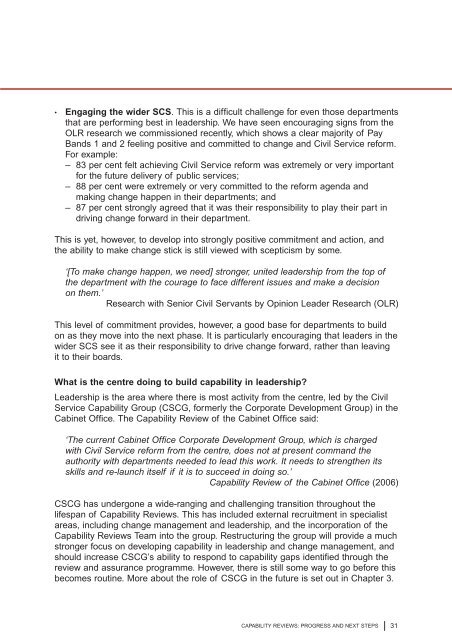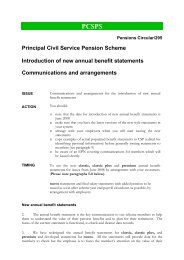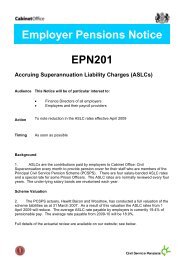Capability Reviews: Progress and Next Steps - The Civil Service
Capability Reviews: Progress and Next Steps - The Civil Service
Capability Reviews: Progress and Next Steps - The Civil Service
- No tags were found...
Create successful ePaper yourself
Turn your PDF publications into a flip-book with our unique Google optimized e-Paper software.
• Engaging the wider SCS. This is a difficult challenge for even those departmentsthat are performing best in leadership. We have seen encouraging signs from theOLR research we commissioned recently, which shows a clear majority of PayB<strong>and</strong>s 1 <strong>and</strong> 2 feeling positive <strong>and</strong> committed to change <strong>and</strong> <strong>Civil</strong> <strong>Service</strong> reform.For example:– 83 per cent felt achieving <strong>Civil</strong> <strong>Service</strong> reform was extremely or very importantfor the future delivery of public services;– 88 per cent were extremely or very committed to the reform agenda <strong>and</strong>making change happen in their departments; <strong>and</strong>– 87 per cent strongly agreed that it was their responsibility to play their part indriving change forward in their department.This is yet, however, to develop into strongly positive commitment <strong>and</strong> action, <strong>and</strong>the ability to make change stick is still viewed with scepticism by some.‘[To make change happen, we need] stronger, united leadership from the top ofthe department with the courage to face different issues <strong>and</strong> make a decisionon them.’Research with Senior <strong>Civil</strong> Servants by Opinion Leader Research (OLR)This level of commitment provides, however, a good base for departments to buildon as they move into the next phase. It is particularly encouraging that leaders in thewider SCS see it as their responsibility to drive change forward, rather than leavingit to their boards.What is the centre doing to build capability in leadership?Leadership is the area where there is most activity from the centre, led by the <strong>Civil</strong><strong>Service</strong> <strong>Capability</strong> Group (CSCG, formerly the Corporate Development Group) in theCabinet Office. <strong>The</strong> <strong>Capability</strong> Review of the Cabinet Office said:‘<strong>The</strong> current Cabinet Office Corporate Development Group, which is chargedwith <strong>Civil</strong> <strong>Service</strong> reform from the centre, does not at present comm<strong>and</strong> theauthority with departments needed to lead this work. It needs to strengthen itsskills <strong>and</strong> re-launch itself if it is to succeed in doing so.’<strong>Capability</strong> Review of the Cabinet Office (2006)CSCG has undergone a wide-ranging <strong>and</strong> challenging transition throughout thelifespan of <strong>Capability</strong> <strong>Reviews</strong>. This has included external recruitment in specialistareas, including change management <strong>and</strong> leadership, <strong>and</strong> the incorporation of the<strong>Capability</strong> <strong>Reviews</strong> Team into the group. Restructuring the group will provide a muchstronger focus on developing capability in leadership <strong>and</strong> change management, <strong>and</strong>should increase CSCG’s ability to respond to capability gaps identified through thereview <strong>and</strong> assurance programme. However, there is still some way to go before thisbecomes routine. More about the role of CSCG in the future is set out in Chapter 3.CAPABILITY REVIEWS: PROGRESS AND NEXT STEPS31
















